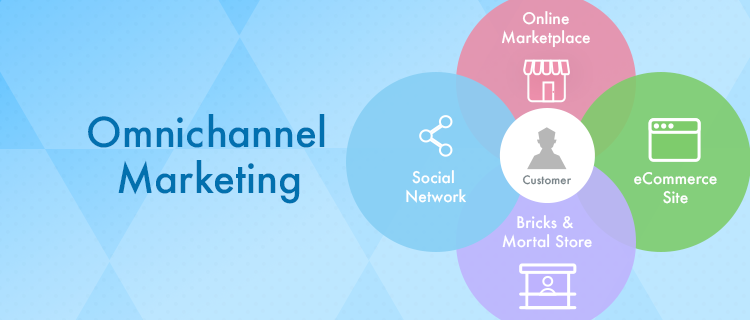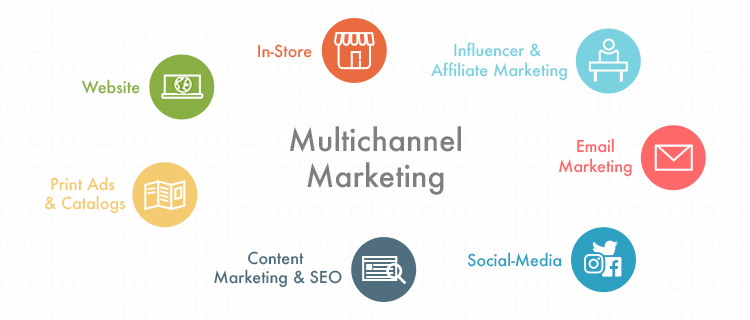Omnichannel and Multichannel are two buzzwords that are center staged in this technological era of marketing.
Both Omnichannel and Multichannel are strategies employing multiple channels to allure potential customers. Many times they are confused to be the same although being distinctive in many aspects.
So let us get over the dilemma and dive in the details of these two terms.
In this article, I will have my chances to bring light on these two terms and then discuss how we can leverage them for the betterment of our business.
In the start, I will try to define these two terms then the next attempt will be to elaborate on their differences. And in the last, I will focus on their implementation.
![]()
Definitions of Omnichannel and Multichannel
Omnichannel

Marketers and advertisers are there for a very long time.
As a millennial, I remember advertisements in the newspapers, billboards and those TV ads were very prevalent during my childhood.
Now it is not that these practices have been abolished but they are not as popular as they were.
The electronic methods are the favorites ones are they are more yielding and trackable. And that’s the factor driving the rise of Omnichannel Marketing.
Omnichannel Marketing is all about providing product information and purchase opportunity at every business-customer touchpoint on all over the web.
It is a sales approach providing the user an integrated purchase opportunity. So that the customer can make the purchase from any point on the internet.
Let us take a real-life example for better clarity.
Imagine you were planning a holiday. In your facebook wall feeds, you saw a hotel ad it matched your interest so you clicked.
Now you are on their website. Everything looks impeccable so you proceed to make a booking. But due to some interference, you didn’t complete the booking.
A few days later you received an email from the hotel offering the same room at a discount.
The offer was reasonable so you accepted it and made the booking.
Now as the journey date comes closer you start seeing ads of upselling services like airport pickups, city tours, and attractions on your social media feed and webpages you visit.
This is Omnichannel Marketing.
Multichannel Marketing

Multichannel is a marketing strategy to interact with the customer on different channels. Thus expanding the chances of customer interaction.
The channels can be printed ads, emails, websites, physical touchpoints, SMS, etc…
Multichannel Marketing is an approach to place your product on multiple channels so that the customer can purchase from any of his preferred channels.
So it is a practice to interact with your product on multiple platforms. Again let us try to understand it with the help of an example.
This time imagine that you are a hotel owner. You are taking bookings from your hotel booking website, also have listings on multiple OTAs like booking.com and Expedia.
You also take direct bookings from the guests who walk directly in your hotel. Then your catalog is also available at your facebook page and twitter handle.
Ergo, you have provided the customer with plenty of options to interact with your brand.
The customers can book from any of the platforms they prefer. Hence increasing the chances of bookings.
This is multichannel marketing in action.
Understanding the difference between Omnichannel and Multichannel
Although the definitions Omnichannel and Multichannel marketing shout the differences very loud. But some points can enumerate the differences with a bit more clarity.
The foremost difference is how they use multiple channels. Multichannel provides the customer with multiple options to interact with the company.
So this approach product-centric.
On the other hand, Omnichannel is customer-centric. This approach ensures that the customer gets a unified experience on all the channels.
The multichannel strategies aim for maximum customer interaction by using multiple channels.
On the contrary, the omnichannel link multiple channels so that the customer has a good experience with the brand on each channel.
This brings us to the next point i.e. the consistency. Omnichannel is a more consistent approach.
The focus of this marketing strategy is that the customer has a similar experience with the brand. Making it more consistent.
Implementation
Omnichannel Marketing
Collect the data to make the strategy
The first step is to collect the data regarding your customers. The main objective here is to understand who are your customers, what are their preferences and their purchase behavior.
This data will assist you in designing a conducive omnichannel marketing campaign.
You will be able to set realistic targets and plan your business expansion with the right idea.
A campaign based on assumptions is liable to fail. You can’t seek new opportunities with your assumptions. It can be detrimental for the business.
So the first step is the gathering and interpreting the data.
Make Buyer Personas
Post gathering and interpreting the data the time comes to create buyer personas. This means how that now you have to segregate your potential customers.
The basis of segregation can be their buying frequency, the preferred way of communication and other likings and dislikings.
You must also include customers other than your classic customers so that you can expand your customer base.
Once you are through with this you proceed to make an omnichannel strategy with high chances of success.
Sketch out the purchase path
The customer journey a not a simple straight path, the internet has made it a complex structure that is very unpredictable.
If you do not observe him then your customer can surprise you by taking an out of the box decision.
Let us try to understand it with the help of the hotel industry.
When a customer plans his journey, his decision is governed by many factors.
The first in location and hyper location. Once the location is final then he checks out the hotels in that area. Then the booking decision will be taken based on brand name, features, and services offered, loyalty and prices.
You must track this consumer journey to make a proper omnichannel strategy.
Multichannel Marketing
List the channels you want to focus
Well, of course, you cannot be on all the channels out there. And there is no need also. So must finalize the channels that you are going to target.
Again this decision has to be data-driven. Data is the fuel for almost every marketing campaign that you want to run.
So gather the information and checkout on which channels your customers are highly active. Then include those channels in your campaign.
Be consistent
If the buying experience on every channel is not the same then the moto here is defeated.
So always optimize the experience on all the channels and make everything consistent. Multichannel marketing aims to provide multiple options without experience degradation.
And it is also very important for your brand value. Everything should be the same as it speaks a lot about your brand.
Analyze Performance
It is very necessary to always test your channels’ performance. Once we have launched our campaign with several channels like emails, social media, and mobile pages we must test their efficiency also.
What’s the investment on each channel, how much traffic they are bringing in and what’s the ROI. You have to keep track of everything.
Then remove the underperforming channels and add new channels that you think will perform better.
This way you will have the desired results.
Conclusion
Technology has given us many things but has also complicated our lives. The buyers’ journey is not a linear path but a complex web.
We must follow the customer all over this web. And this makes Omnichannel and Multichannel marketing very important.
So this was my take on Omnichannel and Multichannel hope you like them and I was able to explain the topic efficiently. Please drop your thoughts in the comments.
Your suggestions will be very useful to me.
If you want to learn about QloApps then you can do it here. If you want to contact the team then please visit our Forum.
